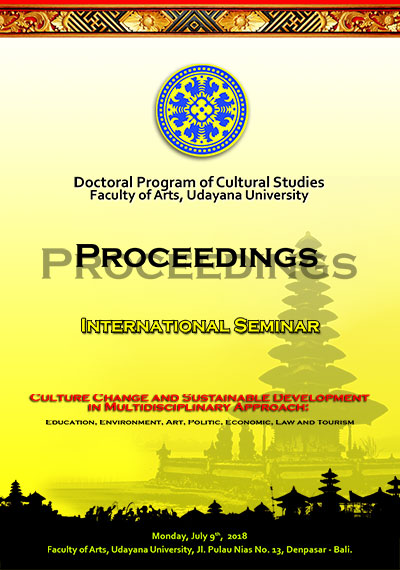THE HUMAN BEHAVIOR IN SAMKHYA’S TEACHING: ETHICS PERSPECTIVE
Abstract
Samkhya is the oldest school that trying to harmonize the Vedic philosophy scriptures through the rational mind. Samkhya explains the cosmic evolutionary process of the universe. The term Samkhya comes from a word which means the amount of numbers to calculate the cosmic evolutionary principles in a rational way. Samkhya teaches dualism knowledge that makes possible the distinction between soul and body (spirit-objects) or Purusa and Prakerti consisting of 25 categories. Purusa and Prakerti are composed of tri-use ethics of sattwa, rajas, and tamas. These three gunas are in equilibrium (samyavastha). Prakerti requires the presence of Purusha to be known and appreciated, and Purusha requires the assistance of prakerti to distinguish itself from prakerti to obtain deliverance (kaivalyartham).
Downloads
References
Pendit. S. Nyoman.2007. Filsafat Hindu Dharma Sad-Darsana (Enam Aliran Astika/Ortodoks, Buku Kedua. Jakarta: Pustaka Bali Post.
Sukayasa, dkk. 2010. Agama dan Religiusitas Hindu: Reinterpretasi Siatem keyakinan Hindu di Indonesia untuk Mengokohkan Moral Umatnya (Jilid I ). Denpasar: Penelitian dibiayai oleh Dirjen Bimas Hindu Kementrian Agama republic Indonesia.
Suseno, Magnis Frans. 2004. Etika Dasar. Masalah-Masalah Pokok Filsafat Moral. Yogyakarta: Kanisius. Nala, Ngurah.1989. Ayurveda Ilmu Kedokteran Hindu I, Cetakan I. Denpasar: Percetakan Bali.

This work is licensed under a Creative Commons Attribution-NonCommercial-ShareAlike 4.0 International License.





